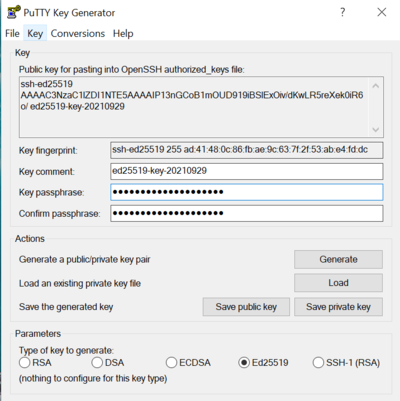Generating Ssh Keys For Windows
RegClean Pro Key Overview:RegClean Pro 6.2 With Serial Keys Full Download comes to fix the Registry which is a critical part of Windows. Since the registry is in constant use due to regular PC usage, it can get cluttered over time. Serial key generator for synapse x.
For recommendations, see options for SSH keys. Generating a new SSH key pair. If you want to create: An ED25519 key, read ED25519 SSH keys. An RSA key, read RSA SSH keys. ED25519 SSH keys. The book Practical Cryptography With Go suggests that ED25519 keys are more secure and performant than RSA keys. Warning: If you are saving your keys under C:/User/username/.ssh ( the default place), make sure to back up your keys somewhere (eg your password manager). After the most recent Windows 10 Update (version 1607), my.ssh folder was empty. This is where my keys have always been, but Windows decided to delete them when updating. If you don't already have an SSH key that you want to use, you'll need to generate one. In this article, we'll show you how to check for existing SSH keys and generate a new SSH key pair. Downloading PuTTYgen. The easiest way to generate SSH keys on Windows is by using PuTTYgen. PuTTYgen is a free open source GUI for generating SSH key pairs.
How to generate an SSH key in Windows 10
To generate an SSH key in Windows 10:
- Ensure the Windows 10 OpenSSH client is installed.
- Run “ssh-keygen” in Command Prompt and follow the instructions to generate your key.
Applies to Windows 10 1803, and up
Generating SSH keys in a Windows environment used to be a convoluted process which required the installation of third-party tools. Since the Windows 10 April 2018 update, Windows has shipped with a preinstalled OpenSSH client, which means you can use ssh-keygen to generate SSH keys. Read on as we walk you through the entire process.
First, you’ll need to make sure OpenSSH is installed on your machine – if you upgraded from an earlier version of Windows 10, you may need to manually enable it. Launch the Settings app and click the “Apps” category. Next, click the “Manage optional features” link. If you don’t see “OpenSSH Client” in the list which appears, click the “Add a feature” button and install it. You might need to reboot your PC after the installation.
If you do not have a key pair yet, start with generating new key pair. Configure Server to Accept Public Key Connect to your SSH server using WinSCP with the SSH protocol, using other means of authentication than public key, e.g. Typically using password authentication. You can generate an SSH key on Windows using the PuTTY SSH client. You can download PuTTY for free from this URL. To generate a key with PuTTY, you should: Download and start the puttygen.exe generator. In the 'Parameters' section choose SSH2 DSA and press Generate. Move your mouse randomly in the small screen in order to generate the key pairs. Generating SSH Keys for SFTP/SSH (FileZilla, Cyberduck, Dreamweaver, etc.) Two-factor authentication is becoming a security standard for large organizations. Many of you are already accustomed to using Duo to authenticate when using Box, WebEx or OSU Google GSuite apps.
Ssh Keys On Windows
Once OpenSSH is installed, you’re ready to proceed. Open Command Prompt from the Start menu. Type “ssh-keygen” (without the quotes) into the terminal window and press enter. You’ll be prompted to confirm the save location. We recommend pressing enter to use the default location in your user directory. Otherwise, type a path to save the key in and then press enter.
You can now choose to add a passphrase (password) to the key. If you add one, you’ll need to supply it whenever you use the key. Either type a passphrase and press enter or press enter immediately to proceed without one.
Generate Ssh Key Windows
Windows will now generate your RSA public/private key pair. The public key will be stored as “id_rsa.pub” in the directory you specified. Upload this key to any machines you need to SSH into. You can then open a connection using Windows’ built-in SSH client – type “ssh [email protected]” to connect and authenticate using your generated credentials.
Share This Post:

SSH, the secure shell, is often used to access remote Linux systems. But its authentication mechanism, where a private local key is paired with a public remote key, is used to secure all kinds of online services, from GitHub and Launchpad to Linux running on Microsoft’s Azure cloud.
Generating these keys from Linux is easy, and thanks to Ubuntu on Windows, you can follow the same process from Windows 10. But even without Ubuntu, SSH keys can also be generated with the free and open source Windows application, PuTTy
Over the following few steps, we’ll guide you through the process of generating SSH keys using both Ubuntu on Windows and PuTTY.
Requirements
All you need is a PC running Windows 10 and either of the following installed:
- The
puttygen.exeexecutable from PuTTY
Generate Ssh Key Windows For Github
If you don’t already have Ubuntu on Windows, take a look at our Install Ubuntu on Windows 10 tutorial.